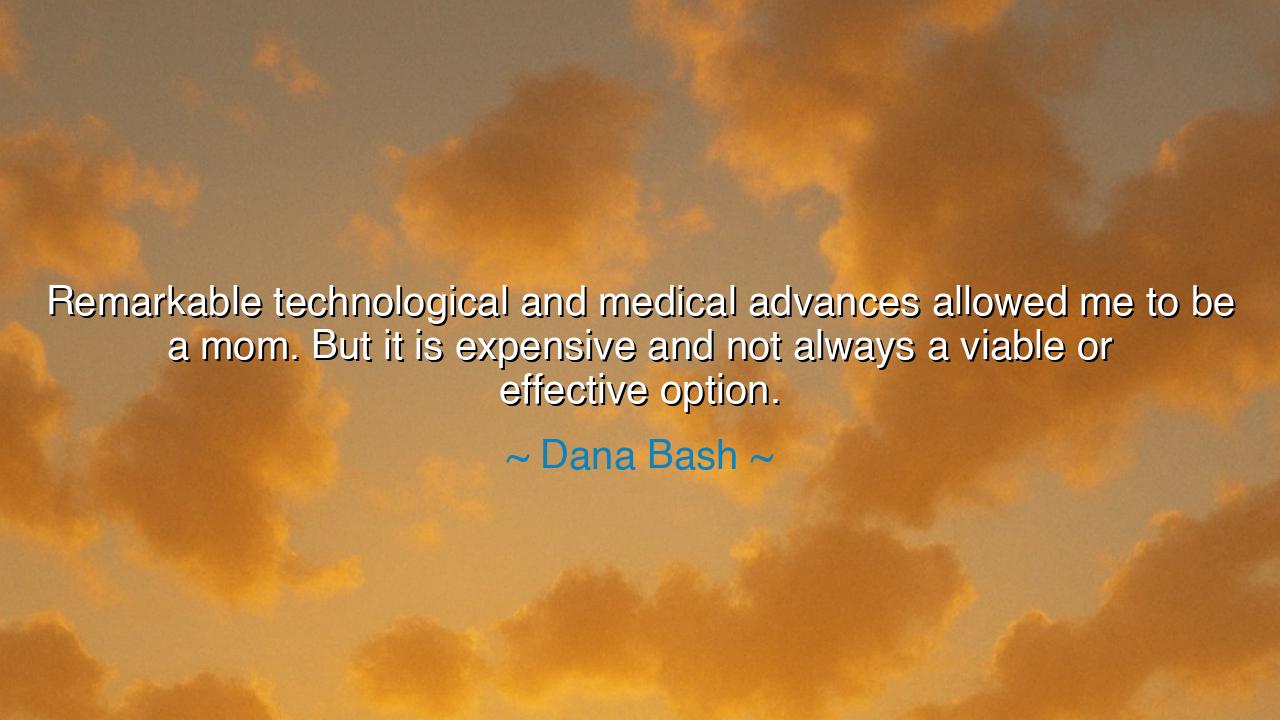
Remarkable technological and medical advances allowed me to be a
Remarkable technological and medical advances allowed me to be a mom. But it is expensive and not always a viable or effective option.






The words of Dana Bash—“Remarkable technological and medical advances allowed me to be a mom. But it is expensive and not always a viable or effective option.”—are at once a song of gratitude and a lament of reality. In her voice echoes the joy of a dream fulfilled and the sorrow of knowing that such dreams remain beyond the reach of many. Beneath these words lies a truth both timeless and modern: that the miracles of science, while wondrous, are not yet the universal gifts of compassion they were meant to be. Bash speaks as one who has glimpsed both the power and the price of human innovation—the triumph of life born through medicine, and the injustice that such hope is rationed by wealth and circumstance.
In the ancient world, motherhood was seen as both a divine blessing and a perilous undertaking. Women risked their lives to bring forth new generations, and even kings could not command fertility. The ancients prayed to Isis, Demeter, or Hera, seeking favor from forces beyond human control. Yet in our modern age, we have learned to harness the laws of biology and to turn technology into miracle. Through in vitro fertilization, surrogacy, and other medical marvels, those once deemed barren now hold life in their arms. Bash’s gratitude reflects this evolution of hope: that what was once the realm of the gods has become, through human courage and knowledge, an act of science. And yet, she reminds us, the divine paradox remains—miracles are still not for all.
The origin of this quote lies in Bash’s own experience with fertility treatments, a journey shared by millions but understood by few. She speaks not as a celebrity or a journalist, but as a woman who faced the heartache of longing for motherhood while navigating the trials of modern medicine. Her words strip away the illusion that technological progress has made parenthood easy. For every success story, there are countless unseen struggles—failed procedures, emotional exhaustion, and financial burdens so great that hope itself can become a luxury. In her statement, Bash honors not only her own child but all who fight silent battles in the pursuit of life. She stands as both witness and messenger, saying to the world: reverence science, but remember humanity.
Throughout history, we have celebrated progress as salvation, forgetting that progress without access is merely privilege. Consider the story of Louise Brown, born in 1978 as the world’s first “test-tube baby.” Her birth was hailed as a triumph of medicine, a herald of a new age of possibility. Yet even as that moment inspired awe, it also revealed inequality—the realization that such breakthroughs would remain beyond reach for many families. Decades later, the divide remains. Science has raced forward, but compassion has lagged behind. Bash’s words echo this ancient imbalance: knowledge grows, but justice must catch up. For what good is progress if it does not serve the full circle of humanity?
Her reflection carries a moral weight that transcends biology. It is a reminder that the value of technological and medical advances is not measured only by their success, but by their availability. A civilization’s greatness is not proven by what it can create for the few, but by what it provides for the many. The power to create life through science is sacred—but when it becomes the privilege of wealth, it begins to mirror the hierarchies of old, where divine favor fell only upon the chosen. Bash’s words awaken our collective conscience to this truth: that innovation without compassion is hollow, and medicine without equity is incomplete.
At the same time, there is deep courage in her gratitude. She does not curse the imperfection of the system; she honors the miracle that touched her life while acknowledging the responsibility it creates. To experience such grace and not speak for others would be to waste it. In her humility, she becomes a voice for the voiceless—the couples still waiting, the women still struggling, the families who cannot afford the medicine that could transform their lives. Her words invite us to see science not as a ladder of competition, but as a bridge of empathy—one that must extend across class, culture, and circumstance.
From Dana Bash’s reflection, we learn a truth both ancient and eternal: that every miracle carries a duty. The marvels of modern medicine are not the final victory of progress—they are its test. Humanity’s greatness lies not only in its discoveries, but in how it chooses to share them. Let those who have been blessed by technology become advocates for those still waiting. Let policymakers and physicians remember that their task is not only to innovate, but to include. And let us, as a people, measure the worth of our age not by how many miracles we can create, but by how many hearts they can reach.
Thus, Bash’s quote stands as both hymn and warning—a hymn to the astonishing power of science, and a warning that it must serve compassion before pride. Her story reminds us that the pursuit of life is not merely biological, but spiritual—that progress divorced from mercy will always fall short of wisdom. And so, let these words be remembered as a call to the generations: to build a world where no woman must choose between her dreams and her means, where no child is the privilege of fortune, and where every miracle is shared as freely as the breath that sustains us all.






AAdministratorAdministrator
Welcome, honored guests. Please leave a comment, we will respond soon